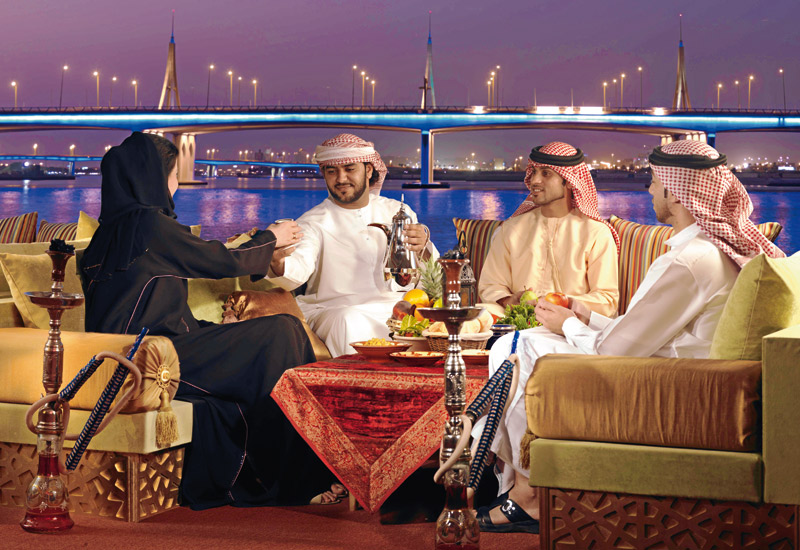Success in Saudi Arabia
In Saudi Arabia, AKMC Al Shohada Hotel in Makkah generates more business for the food and beverage division during Ramadan than any other month of the year.
“Ramadan is the best month as it represents approximately 24% of the total budget of food and beverage. The average spend increases by 35% and the number of covers increases by nearly 200% when comparing iftar to dinner normally,” explains general manager, Sameh Elnashar, who also sees a 70% increase in his room service business.
He continues: “We usually open one restaurant and two banqueting halls for iftar which accommodate up to 1500 people and one restaurant for suhour for 600 people as well as a full lobby for Ramadan special dishes and drinks.

| Advertisement |
“AKMC Al Shohada Hotel also experiences high demand for outside catering for both iftar and suhour for corporate clients.”
There’s no doubt that a lot of time and effort is spent on such investments.
The Meydan and Bab Al Shams, both part of the The Meydan Hotels & Hospitality Division in Dubai, take a long-term approach, investing heavily in creating specific concepts and venues that can be used in subsequent years as well as capitalising on business from corporate iftars and outside catering.
“There are a lot of things we buy — not for one night or one month but we buy them for years, so with regard to costs, they’re covered. We cannot do business without it making financial sense. Now we focus on the concept and the theme to go with the occasion and that’s what attracts people to us,” explains Nasralla.
The renowned ‘Al Hadheerah’ venue, which as an Arabic concept lends itself perfectly to the occasion, has managed to sustain itself over the last few years with only an 8% drop in business between 2008 and 2010, which, the vice president is keen to emphasise, is due to the movement of Ramadan into the summer period which sees many residents travelling.
Stand-alone Restaurants
While large hotels often have the resources and the manpower to reinvent themselves for Ramadan, smaller businesses may have to be even more creative to bring in the business. As well as looking to attract customers, they will also bring effective time management into the equation, using the period to prepare for the busy season following Ramadan.
Walid Maalouf, general manager of acquisitions and development for the Hospitality Development Company (HDC) in Qatar, responsible for restaurants including Burj al Hamam and Pampano, explains: “Ramadan is a quiet period across the region and most restaurants need to adjust their pace with the late opening hours that extend into the early hours of the morning.
We therefore use the time when we are not operating to revamp our outlets while encouraging our staff members to take annual leave, in advance of preparation for Eid celebrations and the new season”.
That’s not to say that the team is resting on its laurels. While opening hours are restricted from the norm, different initiatives come into play.
“We adapt our venue offering by introducing a special Lebanese buffet and set menu at both iftar and suhour,” explains Maalouf.
“We are preparing a special take away menu for our restaurants and also a home delivery menu for Burj Al Hamam. This will undoubtedly lead to an increase in business.
“We will also be serving shisha at the restaurant for the first time during Ramadan, since shisha plays an integral part within Arab culture, and is in particular demand during this period.”
The franchise restaurant and café, Paul, managed across the UAE, Qatar, Kuwait, Bahrain and Jordan by lifestyle retail company Azadea, is perhaps an ideal example of where a non-Middle Eastern concept adapts its business to the region.
“For our business, it is decreasing definitely, because the franchise that we operate doesn’t necessarily have the feeling of Ramadan. What we try to do is provide an alternative. We do a set menu and provide Ramadan juices.
We open for take away in all the shops from 9:00 am until iftar,” explains Rudy Haddad, F&B operations manager.
Referencing one of Azadea’s other brands, a Turkish concept called Köşebaşı, other initiatives are taken to drive business. “For Köşebaşı, we do delivery at the Jumeirah Beach Residence (JBR) location and we open until 3:00 am. Normally we open until 12 midnight but we have significant business between 12 midnight and 3:00 am — I would estimate 20% during this time.”









 Search our database of more than 2,700 industry companies
Search our database of more than 2,700 industry companies









